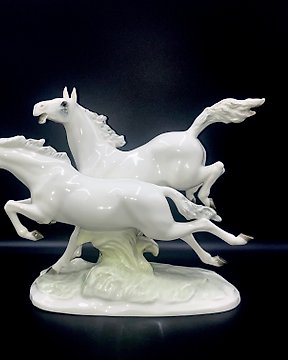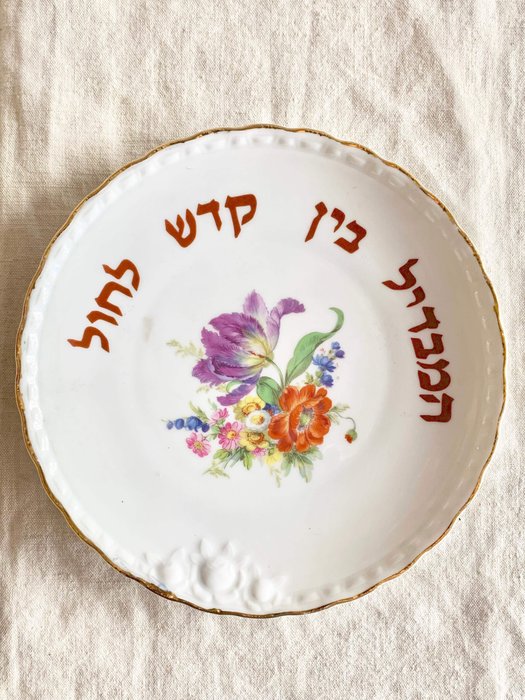
M.H.Fritz - Hutschenreuther Art Department - "In Freedom" (40 cm) - ca 1970 - 雕像 - 瓷
编号 33209937

编号 33209937

Judaica - a magnificent plate for Jewish havdalah ceremony
Crafted in Germany by an artist - circa 1950
Hebrew text - nice quality
Havdalah
Havdalah candle, kiddush cup and spice box
Havdalah (Hebrew: הַבְדָּלָה, "separation") is a Jewish religious ceremony that marks the symbolic end of Shabbat and ushers in the new week. The ritual involves lighting a special havdalah candle with several wicks, blessing a cup of wine and smelling sweet spices.[1] Shabbat ends on Saturday night after the appearance of three stars in the sky.[2]:137 Some communities delay the Havdalah in order to prolong Shabbat.
Customs
Like kiddush, havdalah is recited over a cup of kosher wine or grape juice,[3] although other beverages may be used if wine or grape juice are not available.[2]:141
Spices, called besamim in Hebrew, often stored in an artistically decorative spice container in order to beautify and honor the mitzvah, are handed around so that everyone can smell the fragrance.[2]:143 In many Sephardi and Mizrahi communities, branches of aromatic plants are used for this purpose, while Ashkenazim have traditionally used cloves. A special braided Havdalah candle with more than one wick[2]:145 is lit, and a blessing is recited.[2]:144 If a special havdalah candle is not available, two candles can be used, and the two flames joined when reciting the blessing.[4]
When reciting the words "Barukh atah Adonai Eloheinu melekh ha'olam, bo're m'orei ha'esh," it is customary for the participants to hold their hands up to the candle and gaze at the reflection of the light in their fingernails.[2]:145
At the conclusion of Havdalah, the leftover wine is poured into a small dish and the candle is extinguished in it, as a sign that the candle was lit solely for the mitzvah of Havdalah. Based on Psalms 19:9, "the commandment of the Lord is clear, enlightening the eyes," some Jews dip a finger into the leftover wine and touch their eyes or pockets with it. Because it was used for a mitzvah, the wine is considered a "segulah," or good omen.
After the Havdalah ceremony, it is customary to sing "Eliyahu Hanavi" ("Elijah the Prophet") and/or "HaMavdil Bein Kodesh LeChol" (Who separates Holy from ordinary/weekday), and to bless one another with the words Shavua' tov (Hebrew) or Gute vokh (Yiddish) (Have a good week).
Havdalah is also recited at the conclusion of the following biblical holidays: Rosh Hashanah; Yom Kippur; the first days of Sukkot; Simchat Torah; Passover, both its first and last days; and Shavuot. The blessing over the wine is said, as well as the prayer separating the holy from the everyday, but not the prayers over the havdalah candle or the spices (except for the conclusion of Yom Kippur when the prayer over the havdalah candle is recited).
When a major holiday follows Shabbat, the Havdalah service is recited as part of the holiday kiddush and the blessing over spices is not said. The special braided Havdalah candle is not used since it may not be extinguished after the service, but rather the blessing is recited over the festival candles. The prayer "distinguishes holiness from the everyday" is changed to "distinguishes holiness from holiness" signifying that the holiness of the holiday is of a lesser degree than the holiness of the concluded Shabbat.
Significance
Havdalah is intended to require a person to use all five senses: feel the cup, smell the spices, see the flame of the candle, hear the blessings and taste the wine.[5]
Following a normal Shabbat, the order of the prayers corresponds to the acrostic יבנ"ה Yavneh. This acrostic consists of the initials Yayin (wine), Besamim (spices), Ner (candle), and Havdalah (the Havdalah prayer).[3][2]:140
The order of elements when Havdalah is combined with kiddush (e.g., on a Saturday night that is 'Yom Tov' ("holiday", literally "Good Day") is known by the acrostic יקנה"ז Yaknhaz.[6] This acrostic consists of the initials Yayin (wine), Kiddush HaYom (blessing the day), Ner (candle), Havdala (the Havdala blessing) and Zman (time, i.e. shehechiyanu).
Near the Qaddesh section in some Ashkenazic versions of the Haggadah (e.g. Mantoba 1560, Prague 1526, Venice 1609 and the Goldschmidt Edition),[7]:80 there is a picture of a hunter chasing a hare.[7]:80 This picture is a useful mnemonic for the acrostic יקנה"ז Yaknhaz as it can be described by a Yiddish or German sentence that sounds like Yaknhaz. The Yiddish sentence יאָג 'ן האָז yog ‘n hoz means "hunt a/the hare!" (cf. Yiddish יאָג דעם האָז yog dem hoz). The colloquial German sentence Jag ’en Has' [jakenhaz] also means "hunt a/the hare!" (cf. German Jag einen/den Hasen!).[7]:80-81
Blessings
See also: List of Jewish prayers and blessings § Havdalah
The Ashkenazi liturgy for havdala is as follows:
Blessing Hebrew Transliteration English
On wine בָּרוּךְ אַתָּה ה', אֱ-לֹהֵינוּ מֶלֶךְ הָעוֹלָם, בּוֹרֵא פְּרִי הַגֶּפֶן. Barukh ata Adonai Eloheinu, Melekh ha'olam, bo're p'ri hagefen. Blessed are You, LORD our God, King of the universe, Who creates the fruit of the vine.
On spices בָּרוּךְ אַתָּה ה', אֱ-לֹהֵינוּ מֶלֶךְ הָעוֹלָם, בּוֹרֵא מִינֵי בְשָׂמִים. Barukh ata Adonai Eloheinu, melekh ha'olam, bo're minei b'samim. Blessed are You, LORD our God, King of the universe, Who creates varieties of spices.
The spices are then passed around and smelled by those present.
On the candle בָּרוּךְ אַתָּה ה' אֱ-לֹהֵינוּ מֶלֶךְ הָעוֹלָם. בּוֹרֵא מְאוֹרֵי הָאֵשׁ. Barukh ata Adonai Eloheinu, melekh ha'olam, bo're m'orei ha'esh. Blessed are You, LORD our God, King of the universe, Who creates the lights of the fire.
The candle is held up in the air and those present look at the reflection of the light on their fingernails.
On separation בָּרוּךְ אַתָּה ה' אֱ-לֹהֵינוּ מֶלֶךְ הָעוֹלָם, הַמַּבְדִּיל בֵּין קֹדֶשׁ לְחוֹל, בֵּין אוֹר לְחשֶׁךְ, בֵּין יִשְׂרָאֵל לָעַמִּים, בֵּין יוֹם הַשְּׁבִיעִי לְשֵׁשֶׁת יְמֵי הַמַּעֲשֶׂה: בָּרוּךְ אַתָּה ה', הַמַבְדִּיל בֵּין קֹדֶשׁ לְחוֹל: Barukh ata Adonai Eloheinu, melekh ha'olam, ha'mavdil bein kodesh l'hol, bein or l'hoshekh, bein yisra'el la'amim, bein yom ha'sh'vi'i l'sheshet y'mei ha'ma'a'se. Barukh ata Adonai, ha'mavdil bein kodesh l'hol. Blessed are You, LORD our God, King of the universe, Who distinguishes between the sacred and the secular, between light and dark, between Israel and the nations, between the seventh day and the six days of labor. Blessed are You, LORD, Who distinguishes between the sacred and the secular.
The person who recited the blessings now drinks the wine.
The text of the Havdalah service exists in two main forms, Ashkenazic and Sephardic. The introductory verses in the Ashkenazic version (beginning הנה אל, Hinei El)[2]:140 are taken from the biblical books of Isaiah, Psalms and Esther. In the Sephardic liturgy, the introduction begins with the words ראשון לציון, Rishon L'tsion and consists of biblical verses describing God giving light and success interspersed with later liturgical prose. The four blessings over the wine, spices candle and praising God for separation between holy and profane are virtually identical between the traditions. The phrase בין ישראל לעמים, bein Yisrael l'amim 'between Israel and the nations' is based on Leviticus 20:26.[8] In Reconstructionist Judaism, however, the phrase is omitted, as part of founder Mordechai Kaplan's rejection of the Biblical idea of chosenness.
Modern tunes for Havdalah are based on melodies by Shlomo Carlebach, Neshama Carlebach and Debbie Friedman.